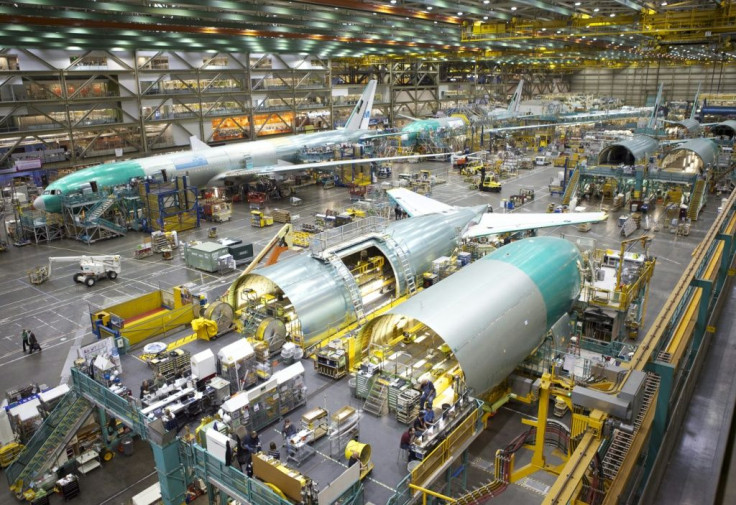Boeing Finally Admits That Aircraft Demand Is Basically Zero
Six months ago -- before the COVID-19 pandemic -- Boeing announced that it would suspend 737 MAX production in January. Its top-selling plane had been grounded since March 2019, following a pair of fatal accidents. Due to Boeing's decision to continue building the 737 MAX while waiting for regulators to recertify the model, the company had built up an inventory of about 400 undelivered 737 MAX jets and was running out of places to store them.
Since then, aircraft demand has plummeted, as the COVID-19 pandemic caused global air travel to dry up. Nevertheless, Boeing restarted 737 MAX production in late May, with plans to ramp up output gradually over the remainder of the year.
Given that few (if any) airlines want new planes right now, this decision didn't make much sense. It didn't take long for Boeing to come to its senses, though. Recently, the company told a major 737 MAX supplier to virtually halt production again.
Boeing and a key supplier manage output
Spirit AeroSystems is arguably the most important supplier to the 737 MAX program. The company (which was spun off from Boeing in 2005) builds the fuselage for each 737 MAX, along with other components like engine pylons and thrust reversers.
For most of 2019, Spirit AeroSystems built 737 MAX shipsets at a rate of 52 per month: even after Boeing reduced its own output to 42 per month. However, once Boeing decided to suspend 737 MAX production temporarily in 2020, it was clear that Spirit would have to slow its production rate. In early February, the partners agreed that Spirit AeroSystems would deliver 216 737 MAX shipsets to Boeing during 2020: an average of just 18 per month. This was part of a broader plan to restart production ahead of an expected mid-year recertification of the 737 MAX.
At that time, most people had no idea that COVID-19 would turn into a global pandemic. As global air travel plummeted in the following months, it became obvious that Boeing's production plans (and, by extension, Spirit's production plans) were unrealistic.
This forced the companies to renegotiate their production agreement. In early May, Boeing and Spirit AeroSystems agreed that the latter would deliver a total of 125 737 MAX shipsets during 2020, including some that had already been delivered.

Production estimates are plunging again
The International Air Transport Association currently estimates that global passenger air traffic will remain more than 25% below 2019 levels in 2021. With demand depressed to that extent, most airlines have far more aircraft than they will need over the next year. Some carriers are still willing to take new jets for one reason or another, but Boeing has less leverage than Airbus for forcing customers to take the aircraft they have ordered. Delivery delays mean that many 737 MAX buyers have the right to cancel certain orders.
As a result, Boeing has finally realized that its plan for a slow ramp-up in 737 MAX production this year was still too aggressive in light of demand. Earlier this month, Spirit AeroSystems announced that on June 4, Boeing had directed it to pause work on four 737 MAX shipsets and avoid starting work on 16 others. Spirit said that it expected that Boeing would ultimately tell it to reduce 2020 output by more than the 20 shipsets affected by the June 4 letter.
Sure enough, Spirit AeroSystems revealed last week that it will now build just 72 shipsets for the 737 program in 2020, of which 35 have already been delivered. This implies a significant cut to Boeing's own production plans for the next six months.
Another warning sign
Entering this year, Boeing stock traded for more than $300. In the "panic" phase of the COVID-19 market sell-off, the stock briefly crashed below the $100 mark, but it recovered strongly in late May and early June. Even after a recent pullback, Boeing shares have been trading for around $170, putting the company's market cap near $100 billion.
At that price, Boeing isn't a good stock for investors to buy. The aerospace giant burned $4.7 billion of cash in the first quarter, and cash burn could accelerate in the near term as Boeing starts to feel the full impact of the pandemic. While the company recently issued $25 billion of bonds, giving it plenty of liquidity for the foreseeable future, that new debt has pushed its total borrowings to nearly $64 billion.
Looking ahead, Boeing will continue to incur massive costs related to the 737 MAX crashes and the subsequent grounding. It also appears that foreign regulators will demand costly design changes. Meanwhile, Boeing may need to increase financial support to critical suppliers to ensure that they're still around when it wants to ramp up production again.
In short, the pain is just beginning for Boeing. Unless the stock price falls significantly or air travel demand quickly recovers to near 2019 levels, this is one stock investors should avoid.




















